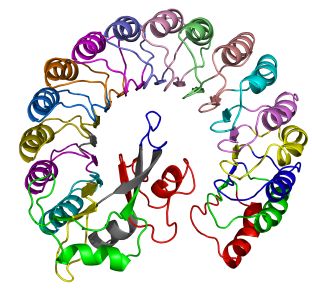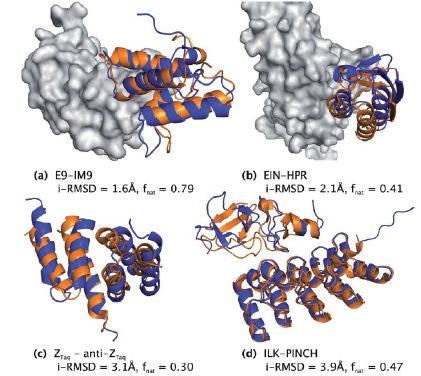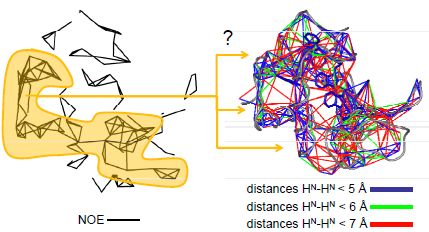Research
Closed loops / Tighentend End Fragments (TEF)
Globular proteins can be decomposed into sub-domain structural fragments with tight ends.
These "tightened end fragments (TEF)"[1] (also named "closed loops"[2]) play an important role
for the fold of a protein.
Our research group
studies the properties of these TEFs and develop algorithms to perform the protein decomposition into TEFs.
The TEF program [3] can be used via the RPBS server
or as a command line program.
References:
[1] M. Lamarine, J.-P. Mornon, I.N. Berezovsky and J. Chomilier
Distribution of tightened end fragments of globular
proteins statistically matches that of topohydrophobic positions: towards an efficient
punctuation of protein folding?
CMLS, Cell. Mol. Life Sci. 58(2001) 492-498
[2] I.N. Berezovsky, A.Y. Grosberg and E.N. Trifonov
Closed loops of nearly standard size: common basic element of protein structure
FEBS Letters (2000), 466:283-286
[3] D. Stratmann, J.S. Pathmanathan, J. Chomilier
TEF 2.0: Tightened End Fragments of globular proteins.
submitted
|

|
Protein-protein docking
CS-HADDOCK
Despite recent advances in ab initio docking of protein-protein complexes, additional information is often required to rank the best solution at the first position. For this purpose, NMR data delivers valuable restraints that can be used in the sampling and/or the scoring stage, like in the data-driven docking approach HADDOCK, which is developed by
Alexandre Bonvin and Co workers
at Utrecht University.
For example, NMR chemical shift perturbation (CSP) data is qualitatively used to identify the binding site on each protein. We showed that chemical shifts (CS) can also be used quantitatively in the scoring stage of the docking to resolve ambiguities that may remain by the sole use of CSP data. The combination of qualitative and quantitative use of chemical shifts should increase the reliability of data-driven docking for the structure determination of complexes from limited NMR data.
The CS-HADDOCK re-scoring method can be downloaded here.
References:
[1] Stratmann D, Boelens R, Bonvin AMJJ.
Quantitative use of chemical shifts for the modeling of protein complexes.
Proteins (2011) 76:2662-2670
|

|
NMR structure-based assignment, NOEnet
|
My PhD project on Novel assignment methods of NMR spectra
for proteins with known tridimensional structure was situated between the fields of biophysics and bioinformatics and supervised by Dr. Carine van Heijenoort and Dr. Eric Guittet at the ICSN CNRS research institute in Gif-sur-Yvette, France.
During my PhD, I developed new methods for the Nuclear Magnetic Resonance (NMR) technique applied on proteins. More specifically, I developed a novel automated assignment approach, named NOEnet, which makes use of available structural 3D information of the protein and Nuclear Overhauser Effects (NOE), as well as chemical shifts (CS) and Residual Dipolar Couplings (RDC).
References:
[1] Stratmann D, van Heijenoort C, Guittet E.
NOEnet--use of NOE networks for NMR resonance assignment of proteins with known 3D structure.
Bioinformatics (2009) 25(4):474-481
[2] Stratmann D, Guittet E, van Heijenoort C.
Robust structure-based resonance assignment for functional protein studies by NMR.
J Biomol NMR (2010) Feb;46(2):157-73
|

|
Publications
[1] Stratmann D, van Heijenoort C, Guittet E.
NOEnet--use of NOE networks for NMR resonance assignment of proteins with known 3D structure.
Bioinformatics 2009 25(4):474-481
[2] Stratmann D, Guittet E, van Heijenoort C.
Robust structure-based resonance assignment for functional protein studies by NMR.
J Biomol NMR 2010 Feb;46(2):157-73
[3] Stratmann D, Boelens R, Bonvin AMJJ.
Quantitative use of chemical shifts for the modeling of protein complexes.
Proteins 2011 76:2662-2670
Contact details
|
University Pierre et Marie Curie (UPMC) - Paris VI
IMPMC, UMR 7590 CNRS Campus Jussieu,
Case courrier 115; 4, place Jussieu,
75252 Paris cedex 05
Campus Jussieu: Towers 22-23, 5th floor, office 502
E-mail: dirk.stratmann@impmc.upmc.fr
Tel: +33-(0)1 44 27 50 79
|

|
|



